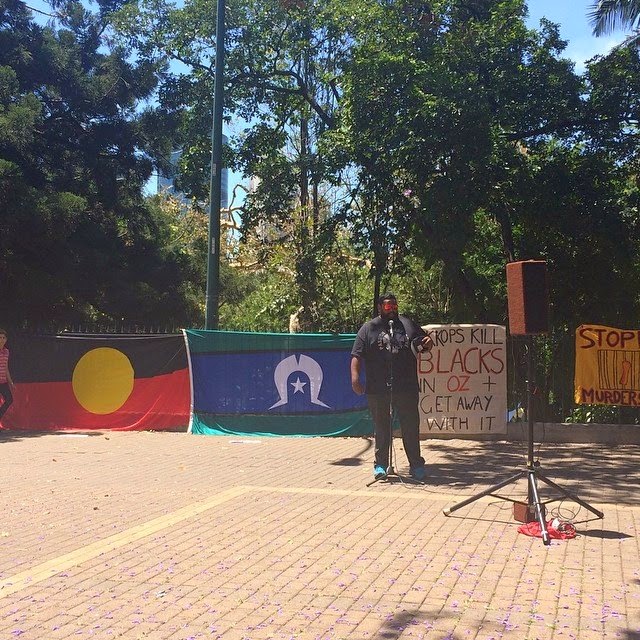Miss Dhu ended up being part of the criminal justice system because of $1000 in unpaid fines. Two days later she was dead. Her death represents a sickness in our society, and in the systems we have created. Systems that do not see Aboriginal people has being human. Systems that abrogate responsibility when someone dies. Brother Ricky Pascoe today said
“the system is the prison, not just the room with bars”.
How true is this statement? We are all part of a much broader system, and any “choice” we have is qualified and limited. Some of us are better placed than others to navigate the world, and this privilege means that it can be hard to see what life is like for those who live outside it.
But there are too many rules, often unspoken, or even at times ever-changing. So many rules that if you’re not equipped you will more than likely fail. The criminal justice system for too many, is the end of the line. Sister Debbie Kilroy said today
‘Miss Dhu’s death reminds us that the system sees Aboriginal women’s lives as disposable”.
Too many Aboriginal women and men end up in jail. What impact does this have on our community’s greater well-being? How can we allow a generation of women and men to be lost to incarceration?
As a mum, I cannot imagine how Miss Dhu’s mother and family must be feeling today. It may be some small consolation to them that people from all over Australia are thinking of their daughter. But their grief is unimaginable to me. As we stood there this morning, one sister requested that Archie Roach’s song, Child play. We bowed our heads as this beautiful, sorrowful yet hauntingly appropriate hymn was played. So many, too many souls now gone. Few stood there today without tears and breaking in their hearts.
The Royal Commission into Aboriginal Deaths in Custody was a comprehensive investigation and clear direction forward into matters of black deaths in custody. I remember how excited we were when the report was published, followed by anger when, over the proceeding decade, it became clear that few of the report’s recommendations had been or would be implemented.
The ongoing over-representation of Aboriginal and Torres Strait Islander people in the criminal justice system is a matter of national importance. Yet it receives scant public interest, and apparently even less policy interest. Aboriginal and Torres Strait Islander people are more likely to be killed while in police custody than by the so-called menace of terrorism. Yet where are the advertising campaigns and press interest? If you’re not seen as human, your deaths and your sorrow are not as important as others.
I have a (slight) hope that Miss Dhu’s unnecessary and senseless death puts a spotlight on Australia, and leads to change. We must continue to talk about the this issue, to keep it in the national spotlight, whether it be through the streets, or in other ways, like art, movies, literature, academic writing, classroom activities. We must continue to keep talking, for to stop means we no longer exist.
My thoughts are prayers are with Miss Dhu’s family, and many other families around the continent, whose loved ones were taken from them too early.

Thank you, Leesa, for sharing your reflections from the Brisbane Chapter of the National Day of Action. Along with stolen cultural heritage we have to struggle to retain, the everyday indignities we are meant to endure, the unjust deaths of our people bring us all to deep, deep concern about what more this society wants from us. Like you, I can't imagine what Miss Dhu's family must be enduring, I can't imagine what Miss Dhu herself endured in her final hours at the hands of those who were by Australian law responsible for her. I can't imagine.
Thank you Sandra for your comment. Still so much work to be done.
Will nurses working in watch houses help to prevent this fatal neglect and discrimination? I have been listening to the debate with the nurses' union saying they don't want nurses and paramedics on duty to support and aid those who are locked up and may be sick, injured or drug affected. Seems like in some communities police can't act with dignity and a duty of care. Other professionals like medicos might offer some greater respect from the outset and be able to bear witness to this discrimination. In some eyes one life seems more worthy than others. I always notice this with homicides and the media attention some victims get over others. No more words to describe this terribleness.
Having trained medical staff certainly couldn't hurt. This issue is also the criminalisation of certain acts – like substance abuse and/or fines. If she hadn't been picked up for the fine in the first place, she would have had an opportunity to get to medical help without the "shadow" of being an offender. We also know that the the law is applied unevenly. Had she lived in a different place (like in an upper-socio-economic area of a large city) and if she were a White Australian, she would have been treated much differently.
The law gives an arrangement of change to individuals who are harmed because of the carelessness of other individuals while driving out and about. Thanks for sharing about family solicitors Brisbane.